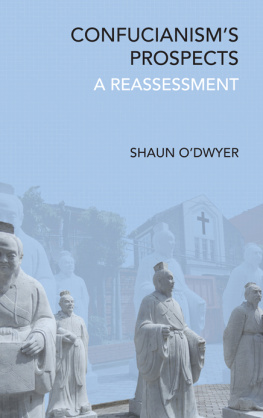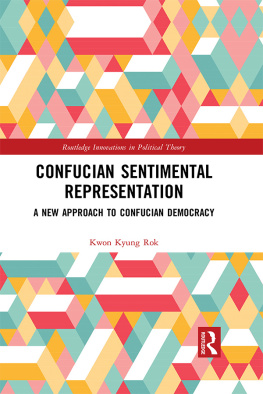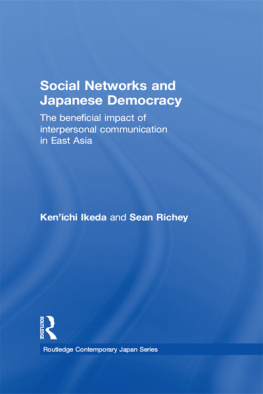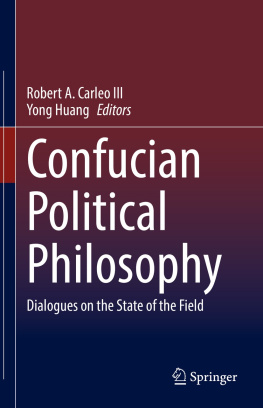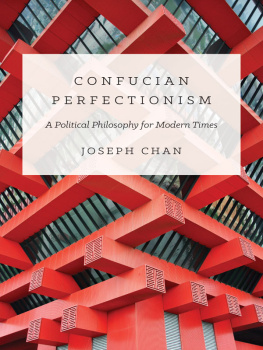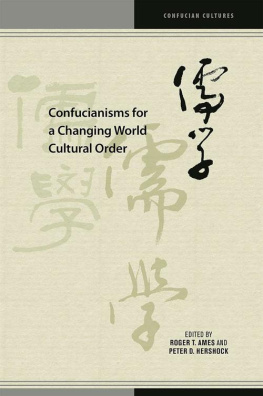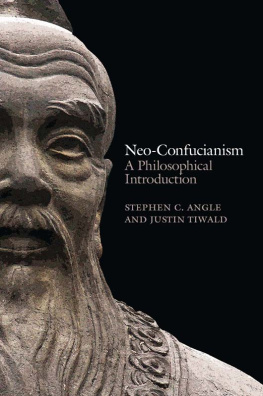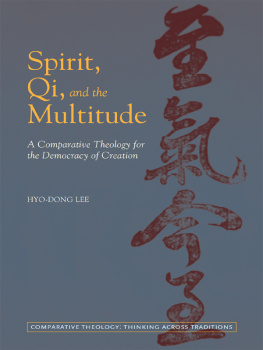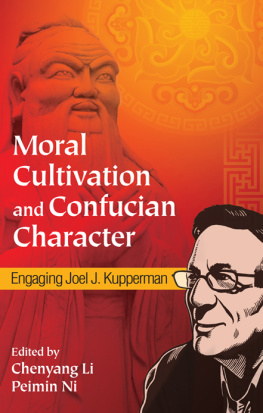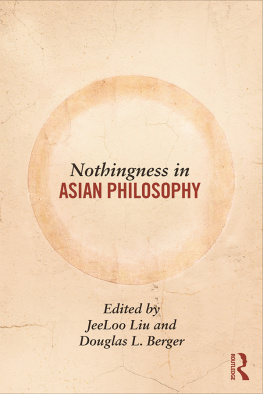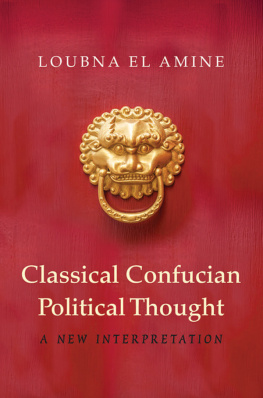CONFUCIANISMS PROSPECTS
SUNY series in Chinese Philosophy and Culture
Roger T. Ames, editor
CONFUCIANISMS PROSPECTS
A REASSESSMENT
SHAUN ODWYER
Cover images taken by the author.
Published by State University of New York Press, Albany
2019 State University of New York
All rights reserved
Printed in the United States of America
No part of this book may be used or reproduced in any manner whatsoever without written permission. No part of this book may be stored in a retrieval system or transmitted in any form or by any means including electronic, electrostatic, magnetic tape, mechanical, photocopying, recording, or otherwise without the prior permission in writing of the publisher.
For information, contact State University of New York Press, Albany, NY
www.sunypress.edu
Library of Congress Cataloging-in-Publication Data
Names: ODwyer, Shaun, 1969 author.
Title: Confucianisms prospects : a reassessment / Shaun ODwyer.
Description: Albany : State University of New York, 2019. | Series: SUNY series in Chinese philosophy and culture | Includes bibliographical references and index.
Identifiers: LCCN 2018040415 | ISBN 9781438475493 (hardcover : alk. paper) | ISBN 9781438475509 (ebook)
Subjects: LCSH: Confucianism.
Classification: LCC BL1853 .O39 2019 | DDC 181/.112dc23
LC record available at https://lccn.loc.gov/2018040415
10 9 8 7 6 5 4 3 2 1
Contents
Preface
This book engages in critical dialogue with a growing English language literature on Confucianism which, at times, has theorized improbable Confucian or communitarian identities for contemporary East Asian societies. It is also a critical dialogue with my own contributions to that literature over a decade and a half ago. Living in Japan in the intervening years has helped cure me of my earlier communitarian tendencies, and of my previous interest in promoting Confucian democracy. For all of its flaws, Japan now strikes me as a consolidated liberal democracy, alongside its neighbors South Korea and Taiwan; and since they democratized, all three nations have provided unprecedented prosperity, civil freedoms, political stability, and peace for their citizens. I doubt that any comprehensive Confucian cultural and moral character can be attributed to East Asian nations today. I do not think a need exists for Confucian democracy to arise in them andtaking into account the rest of East AsiaI suspect the possibilities for democracy to take shape in any form, Confucian or otherwise, in North Korea or China in the foreseeable future are rather low. Part of my motivation for writing this book was to explain and justify these doubts; yet a fair consideration of Confucianisms prospects also required me to investigate its contributions to global political and moral philosophy, and to the diverse moral and civic life of East Asian societies today. I hope that readers will see this as a balanced approach, with sufficient tradition-respect for Confucian thought.
I would like to thank a number of people for helping me see this work through to its conclusion. First, I express my gratitude to the editors at State University of New York Pressto Andrew Kenyon, who initially took an interest in the book proposal, and to Christopher Ahn, Chelsea Miller, and Diane Ganeles for shepherding the manuscript through the peer-review and publication process. I am also grateful to two anonymous peer reviewers who took time to read the manuscript and offer both encouraging and constructive comments. Thanks also are due to Raymond Boisvert, Sungmoon Kim, Phillip Ivanhoe, Stephen Angle, and David Elstein, who read and provided helpful comments on drafts of several chapters. Parts of this book were presented at a workshop on Political Theory from East Asia hosted by the Center for East Asian Philosophy at the City University of Hong Kong in August 2016, at a Europe Japan Research Center seminar at Oxford Brookes University in April 2018 and at the Confucianism, Democracy and Comparative Theory conference hosted by the Institute of Glocal Political Thought at Sogang University in May 2018. I would like to thank attendees for questions and comments that helped me during revisions of this book. Finally, I would like to thank Ginny Tapley Takamori, Kanno Reika, and David Groff for their advice with some Japanese translations.
Two chapters in this book are revised versions of previously published papers. was first published as Epistemic Elitism, Paternalism and Confucian Democracy in Dao 14.1 (2015): 3354. My thanks are due to the editors of these journals for kindly permitting me to incorporate these papers into this book.
Introduction
The Problem of Confucian Heritage
In February 1942, as Japan was consolidating its hold on its newly conquered territories in Malaya, a new military administrator arrived in Singapore. He brought with him an adviser on Chinese affairs who scorned the humanitarian attitude of his predecessor in the military administration, Shinozaki Mamoru. Many years later, Shinozaki described his successors contrasting administrative philosophy:
Mr. Takase claimed to be a Confucian, as well as an authority on China and all things Chinese. He based his claim upon his stay in China and Manchuria. He mistakenly assumed that the Chinese community in Singapore behaved like the Chinese in China and observed the same customs. He wanted to rule by force backed by Confucian guidelines. What he failed to understand was that many Chinese in Singapore were born in Singapore, had been educated in English language schools, and could not read or write Chinese characters. They knew little about Confucius.
In accordance with his philosophy of force backed by Confucian guidelines, Takase proceeded with a scheme to extort fifty million yen from the Singapore Chinese community.
This account must come as a surprise to those who believe that Singapore is a Confucian Heritage Culture, its ethnic Chinese citizens the often unreflective legatees of primordial Confucian values such as filial piety, harmony, and deference to government authority, passed down to them since their ancestors immigrated from their homelands in China. We know
Yet if the pseudo-scholar Takase ignored the cultural heterogeneity between mainland Chinese and diaspora Malay Chinese in the 1940s, todays new Confucian scholars are sometimes as guilty of ignoring the cultural heterogeneity between contemporary East Asian societies and the profound changes in their ethical and political life since the late nineteenth century. Some have also been nave about the alacrity with which autocratic rulers have adopted a cultural identity politics of Confucian values to foster national unity, and reactive self-definition against the West.
This book proposes to disentangle philosophically significant discussion of ethical and political concepts in modern Confucian thought from such empirically undetermined assumptions about East Asian cultural identity. There are strong reasons for thinking that East Asian societies are not accurately described as Confucian societies. This is not to say that East Asian societies alone have endured the consequences of modernization. Following steep declines in participation in the ritual and communal life of Christianity since the 1960s, Western European nations cannot be meaningfully described today as Christian societies either. The respective Confucian and Christian heritages of these societies is not in questionnor is the continued, if diminishing, influence of values derived from those heritages.

